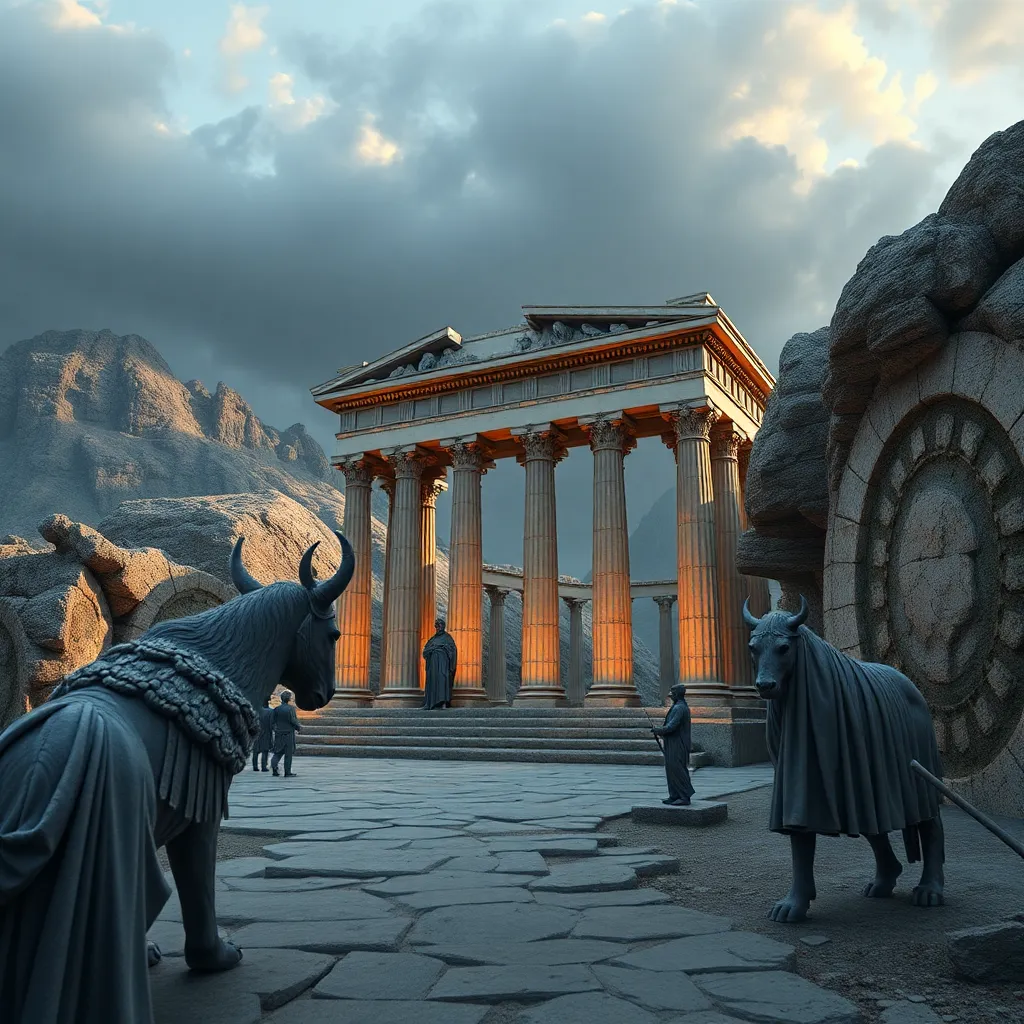The Myths of Ares: A Study of His Influence on Greek Culture
I. Introduction
Ares, the Greek god of war, embodies the violent and chaotic aspects of battle and conflict. Known for his fierce temperament and aggression, Ares represents the untamed nature of warfare, contrasting with other deities associated with more strategic or noble aspects of conflict. This article aims to delve into the myths surrounding Ares and explore his significant cultural impact on ancient Greek society and beyond.
II. The Origins of Ares in Greek Mythology
A. Birth and lineage of Ares
According to Greek mythology, Ares is the son of Zeus and Hera, born into the ruling family of the gods. His lineage situates him among the Olympian deities, but his personality often sets him apart as a less favored god. Unlike his siblings, who often embody more admirable qualities, Ares’ nature is characterized by aggression and a thirst for bloodshed.
B. The role of Ares in the pantheon of Greek gods
Ares held a unique position in the pantheon of Greek gods. While he was undoubtedly powerful, he was not widely worshiped, reflecting the ambivalent attitude of the Greeks toward war. Many viewed him as a necessary force in battle, yet his unpredictability and association with chaos made him less appealing than other gods like Athena, who represented strategic warfare.
III. The Characteristics and Attributes of Ares
A. Depictions of Ares in art and literature
Ares is often depicted in ancient art as a muscular, handsome warrior clad in armor, brandishing weapons like a spear or sword. Artists frequently portrayed him in the midst of battle, surrounded by symbols of war such as shields, helmets, and even vultures. In literature, Ares is characterized by his fierce demeanor and often irrational behavior, embodying the darker side of human nature when it comes to conflict.
B. Symbolism associated with Ares: war, violence, and chaos
- War: Ares is the embodiment of the brutal and violent aspects of war.
- Violence: His actions often lead to destruction and chaos on the battlefield.
- Chaos: He symbolizes the unpredictability of war and its impact on humanity.
IV. Ares in Mythology: Key Myths and Stories
A. Major myths featuring Ares (e.g., the Trojan War)
One of the most significant myths involving Ares is his participation in the Trojan War. He sided with the Trojans against the Greeks, showcasing his preference for conflict over resolution. His involvement highlights not only his role as a war deity but also the complexities of gods taking sides in human affairs.
B. Ares’ relationships with other gods and mortals
Ares’ relationships are often tumultuous. He had an infamous affair with Aphrodite, the goddess of love, which was fraught with tension and jealousy, particularly from her husband, Hephaestus. This relationship underscores the contrast between love and war, demonstrating how these opposing forces can intertwine in myth.
V. Ares vs. Other War Deities: A Comparative Analysis
A. Comparison with Athena: Wisdom vs. Brutality
Ares is often compared to Athena, the goddess of wisdom and strategic warfare. While Ares represents the chaos and brutality of war, Athena embodies the intelligence and strategy that can lead to victory without unnecessary bloodshed. This dichotomy illustrates the different perspectives on warfare in Greek culture.
B. The differing perceptions of Ares and Mars in Roman culture
The Romans adopted Ares into their pantheon as Mars, who was revered not only as a god of war but also as a protector of agriculture and a symbol of military virtue. This transformation reflects the Roman valorization of military strength and discipline, contrasting sharply with the Greeks’ ambivalence toward Ares.
VI. Ares’ Influence on Ancient Greek Society and Warfare
A. The cult of Ares and religious practices
Despite his unpopularity, Ares had a cult following in certain regions of Greece, notably in Sparta, where his attributes of strength and valor were celebrated. Rituals and sacrifices were made in his honor, especially before battles, as warriors sought his favor for victory.
B. The representation of Ares in military culture and ideology
Ares’ influence extended into the military culture of ancient Greece. He was often invoked by soldiers and leaders, and his imagery appeared on shields and armor, symbolizing the desire for strength and courage in battle. His presence served as a reminder of the primal nature of war that warriors had to confront.
VII. Ares in Literature and Philosophy
A. Ares in the works of ancient poets (Homer, Hesiod)
In Homer’s “Iliad,” Ares is depicted as a force of destruction, often acting recklessly and being wounded in battle. Hesiod, on the other hand, portrays Ares as a necessary evil, reflecting the ambivalence of the Greeks towards war. These literary representations highlight the complexities of Ares’ character and role in society.
B. Philosophical interpretations of Ares and war
Philosophers like Plato and Aristotle examined the nature of war and violence, often using Ares as a symbol of the darker aspects of human existence. Ares became a focal point for discussions about morality, ethics, and the human condition in the context of conflict, shaping the philosophical landscape of warfare.
VIII. Conclusion
Ares remains a complex figure in Greek mythology, representing the chaotic and violent nature of war while also serving as a vital part of the cultural and religious fabric of ancient Greece. His influence on literature, military culture, and philosophical discourse reveals the enduring legacy of Ares, reflecting humanity’s ongoing struggles with conflict and aggression. Today, Ares continues to resonate in modern culture, serving as a reminder of the duality of war—its destructive power and the valor it can inspire.




